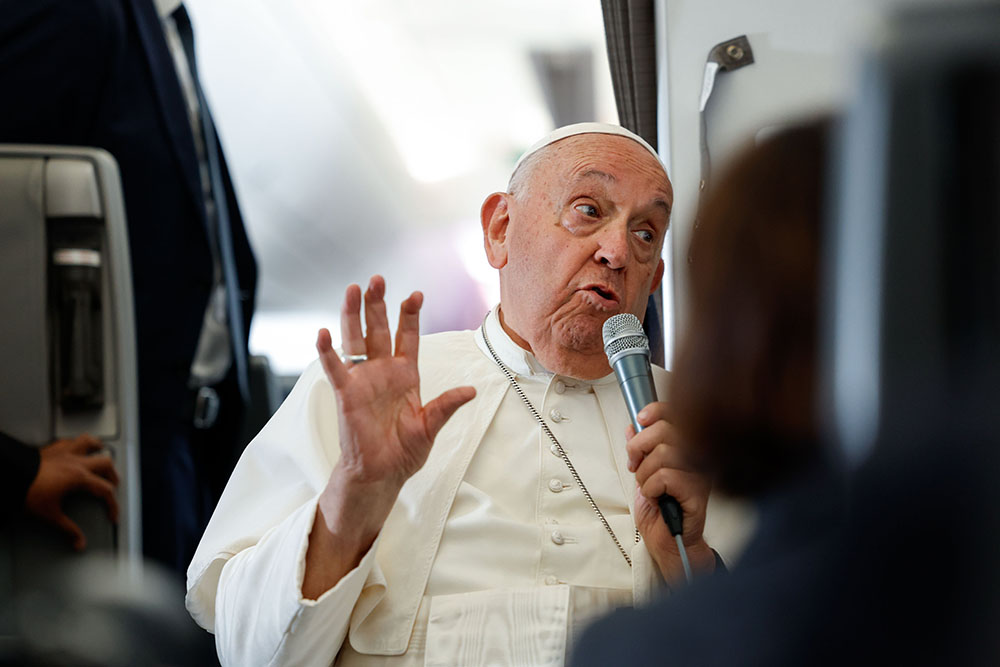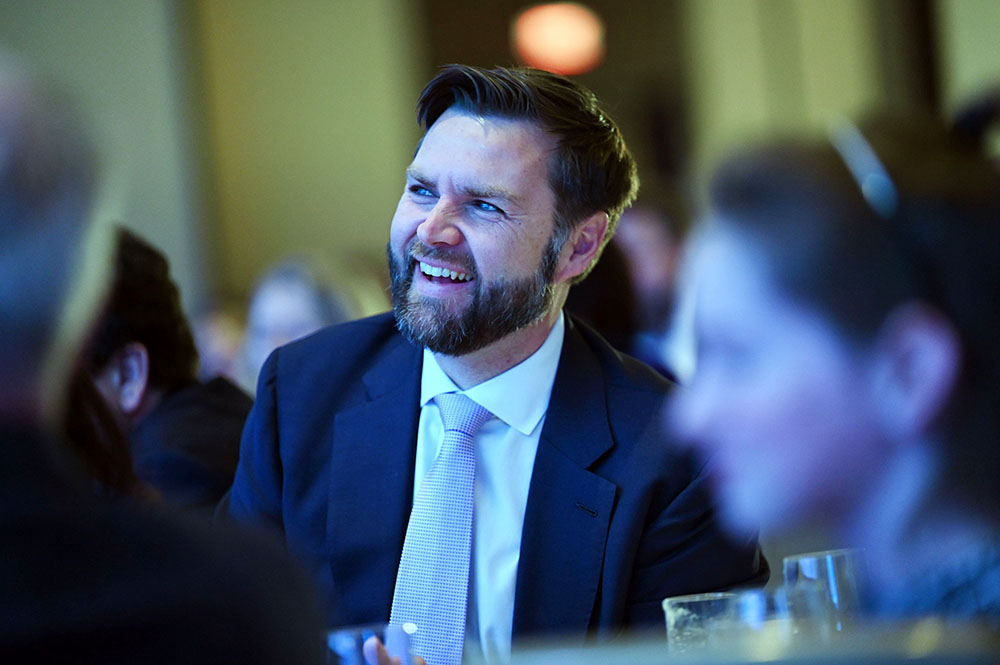
Pope Francis answers a question from a journalist aboard his flight back to Rome Sept. 13, 2024, after visiting Indonesia, Papua New Guinea, Timor-Leste and Singapore. (CNS/Lola Gomez)
There has been much ado about JD Vance being Catholic, but does he attend Mass?
Of course, it is nobody's business if anyone attends Mass — unless the Catholic in question is a candidate for major office.
Remember the "wafer wars" during the Roe v. Wade years of legalized abortion? In 1984, Democratic presidential candidate Walter Mondale's running mate was U.S. Rep. Geraldine Ferraro, the first female and first Italian American nominee of a major political party. She ran into the anti-abortion buzzsaw New York Archbishop John O'Connor, soon to be a cardinal, when she said that Catholics had varied opinions on abortion.
Other Catholic politicians who were known to be pro-choice, notably New York Gov. Mario Cuomo and U.S. Sen. Ted Kennedy of Massachusetts, did not suffer such episcopal ire. Joe Biden, who as a candidate for U.S. Senate and president has echoed Cuomo's "personally opposed" position, also managed to charm Catholic voters, if not all the bishops, despite his defense of the then-constitutional right to abortion.
Things did not go well for Ferraro.
Advertisement
Today, individual bishops still vent their complaints about Biden's stance, and his Mass attendance, and as a body the U.S. Conference of Catholic Bishops' election-season document "Forming Consciences for Faithful Citizenship" again affirms "abortion remains our preeminent priority."
Enter Pope Francis, who in his airborne press conference returning from Southeast Asia was asked, "What advice would you give a Catholic voter faced with a candidate who supports ending a pregnancy and another who wants to deport 11 million migrants?"
The pope's long and thoughtful answer ended with, "Both are against life." He continued: "One must vote. And one must choose the lesser evil. Which is the lesser evil? That lady or that gentleman? I do not know."
Catholic hard-liners accused Francis of moral equivocation. It is a challenge, but it does not have to be.
Realistically, there is no daylight between the presidential candidates on abortion. Each supports it. One prefers restoring a pastiche of state laws, as before the Supreme Court's 1973 decision in Roe. The other prefers a national determination.
Vance, the lone Catholic on either ticket, is diametrically opposed to Catholic teaching, supporting "medical abortion." He has said little if anything about his running mate's pledge to mandate insurance coverage for in vitro fertilization treatments, despite the prohibitions of Catholic moral teachings.

Sen. JD Vance, R-Ohio, smiles during the National Catholic Prayer Breakfast in Washington Feb. 8, 2024. (OSV News/Leslie E. Kossoff)
And then there are Vance's unending false claims about legal Haitian immigrants in Ohio. To be clear, Vance's repeated false and derogatory statements are technically calumny, thereby categorized by Catholic teachings as mortally sinful.
The Ohio Bishops' Conference did say something about the cat-eating falsehoods, but did not cite Vance by name. Nor did the conference deem it necessary to point out his running mate's promise to deport those same immigrants.
So, what to do?
Must one vote for one or the other, as the pope suggests? People who cannot make a choice may write another name on their precious ballots. They may be put off by the Republican's recent felony convictions and sexual assault findings, but still unable to decide between the cat-story lying, pro-abortion Republican team, and the pro-abortion Democratic team headed by a woman.
Which brings us back to Ferraro. Her opponents threw everything at her. Some of it stuck. She was Italian and "connected" (translation: Mafia). She was a tough negotiator (translation: "unfeminine"). Barbara Bush, then the second lady of the United States, said about Ferraro after the 1984 vice presidential debate, "I can't say it, but it rhymes with rich." Today, most people forget that Ferraro's legislative legacy focused on women.
Early voting is already underway. They say the swing states of Arizona, Georgia, Michigan, Nevada, North Carolina, Pennsylvania and Wisconsin will decide. Before Roe, only Pennsylvania fully outlawed abortion. In the rest, it was legal to varying degrees. Things have changed, but not that much.
The basic question, for voters and for the bishops: Which team is more pro-life?








